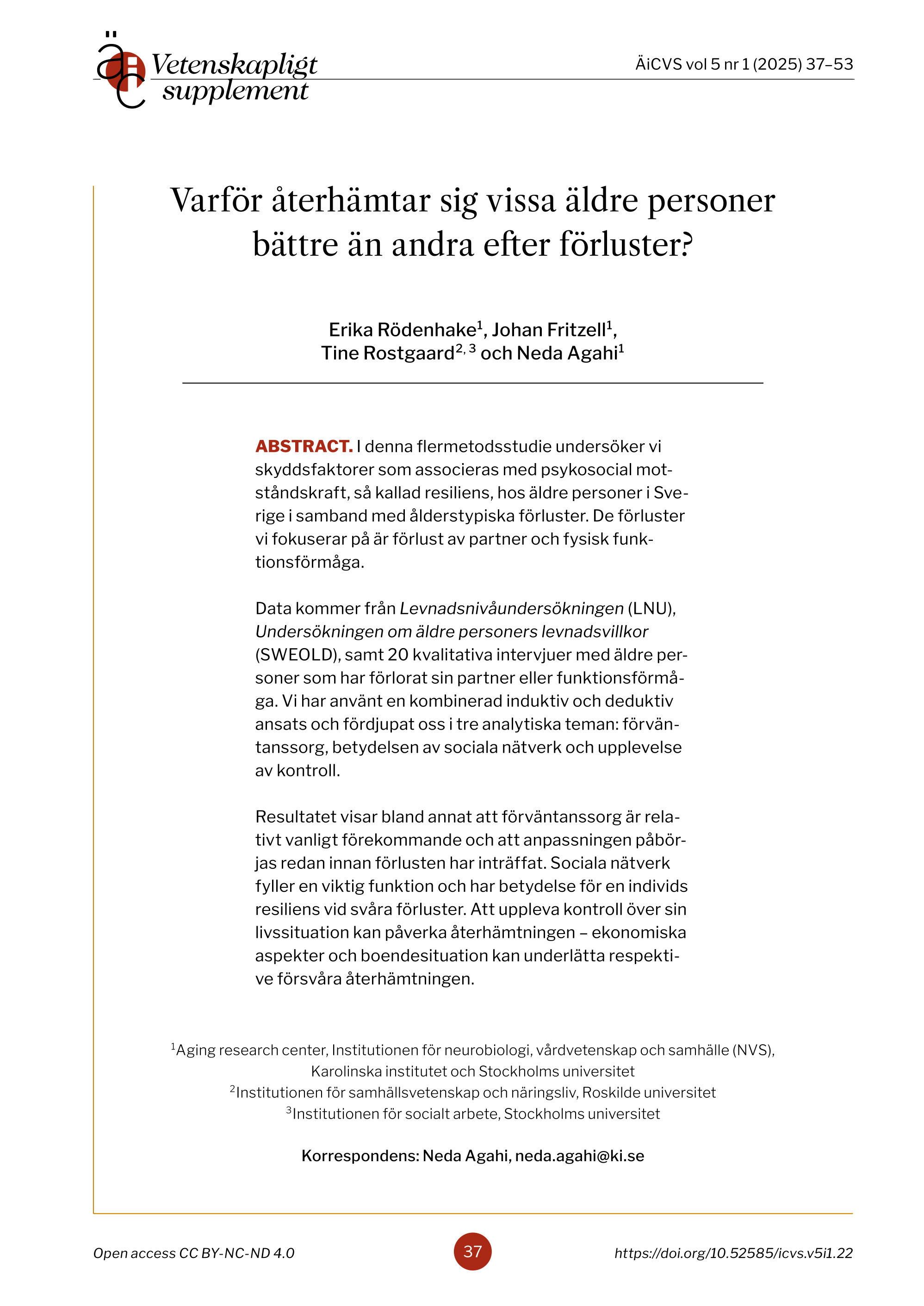Varför återhämtar sig vissa äldre personer bättre än andra efter förluster?
DOI:
https://doi.org/10.52585/icvs.v5i1.22Abstract
I denna flermetodsstudie undersöker vi skyddsfaktorer som associeras med psykosocial motståndskraft, så kallad resiliens, hos äldre personer i Sverige i samband med ålderstypiska förluster. De förluster vi fokuserar på är förlust av partner och fysisk funktionsförmåga.
Data kommer från Levnadsnivåundersökningen (LNU), Undersökningen om äldre personers levnadsvillkor(SWEOLD), samt 20 kvalitativa intervjuer med äldre personer som har förlorat sin partner eller funktionsförmåga. Vi har använt en kombinerad induktiv och deduktiv ansats och fördjupat oss i tre analytiska teman: förväntanssorg, betydelsen av sociala nätverk och upplevelse av kontroll.
Resultatet visar bland annat att förväntanssorg är relativt vanligt förekommande och att anpassningen påbörjas redan innan förlusten har inträffat. Sociala nätverk fyller en viktig funktion och har betydelse för en individs resiliens vid svåra förluster. Att uppleva kontroll över sin livssituation kan påverka återhämtningen – ekonomiska aspekter och boendesituation kan underlätta respektive försvåra återhämtningen.
Why do some older adults adjust better than others after age-typical losses?
This mixed methods article examines protective factors associated with psychosocial resilience in older adults in Sweden in the context of age-typical loss. The losses we focus on are loss of partner and physical functioning.
Data comes from the Level of living survey (LNU), the Swedish panel study of living conditions of the oldest old (SWEOLD) and 20 qualitative interviews with older adults who have lost their partner or physical function. Using a combined inductive and deductive approach, we have made an in-depth examination of three main analytical themes that emerged in the data: anticipatory grief, the importance of social networks and the experience of control.
The results show, among other things, that anticipatory grief is relatively common, and that adaptation begins even before the loss has occurred. Social networks play an important role and are central for an individual's resilience in response to difficult losses.
Experiencing control over one's life situation can affect recovery – financial aspects and the housing situation can facilitate or hinder recovery.
Referenser
Agahi N, Augustsson E, McGarrigle C, Rostgaard T, Fritzell J. Psychosocial resilience surrounding age-typical losses among older adults in Sweden: group-based trajectories over a 25-year-period. Frontiers in public health. 2024;12:1434439. https://doi.org/10.3389/fpubh.2024.1434439
Angevaare M, Roberts J, van Hout HPJ, Joling KJ, Smalbrugge M, Schoonmade LJ m fl. Resilience in older persons: a systematic review of the conceptual literature. Ageing research reviews. 2020;63:101144. https://doi.org/10.1016/j.arr.2020.101144
Bolton KW, Praetorius RT, Smith-Osborne A. Resilience protective factors in an older adult population: a qualitative interpretive meta-synthesis. Social work research. 2016;40(3):171-82. https://doi.org/10.1093/swr/svw008
Connor KM, Davidson JRT. Development of a new resilience scale: The Connor-Davidson resilience scale (CD-RISC). Depression and anxiety. 2003;18(2):76-82. https://doi.org/10.1002/da.10113
Cosco TD, Kok A, Wister A, Howse K. Conceptualising and operationalising resilience in older adults. Health psychology and behavioral medicine. 2019;28;7(1):90-104. https://doi.org/10.1080/21642850.2019.1593845
Daly M. How useful is the concept of resilience for studying individuals and families with low resources? REUsilience; 2024. Thinking about resilience series; 2023:3. https://doi.org/10.31235/osf.io/dv5pb
Doré B, Bolger N. Population- and individual-level changes in life satisfaction surrounding major life stressors. Social psychological and personality science. 2018;9(7):875-84. https://doi.org/10.1177/1948550617727589
Fritzell J, Lundberg O (redaktörer). Health inequalities and welfare resources: continuity and change in Sweden. Första upplagan. Bristol university press; 2007. https://doi.org/10.2307/j.ctt9qgn85
Infurna FJ, Wiest M. The effect of disability onset across the adult life span. Journals of gerontology: Series B. 2018;14;73(5):755-66. https://doi.org/10.1093/geronb/gbw055
Infurna FJ, Wiest M, Gerstorf D, Ram N, Schupp J, Wagner GG m fl. Changes in life satisfaction when losing one’s spouse: individual differences in anticipation, reaction, adaptation and longevity in the German socio-economic panel study (SOEP). Ageing and society. 2017;37(5):899-934. https://doi.org/10.1017/S0144686X15001543
Johansson S. Om levnadsnivåundersökningen. Allmänna förlaget;1970.
van Kessel G. The ability of older people to overcome adversity: a review of the resilience concept. Geriatric nursing. 2013;34(2):122-7. https://doi.org/10.1016/j.gerinurse.2012.12.011
Kommittén Välfärdsbokslut. Välfärd, ofärd och ojämlikhet (SOU 2000:41). Fritzes offentliga publikationer.
Lamond AJ, Depp CA, Allison M, Langer R, Reichstadt J, Moore DJ. Measurement and predictors of resilience among community-dwelling older women. Journal of psychiatric research. 2008;43(2):148-154. https://doi.org/10.1016/j.jpsychires.2008.03.007
Lennartsson C, Agahi N, Hols-Salen L, Kelfve S, Kåreholt I, Lundberg O m fl. Data resource profile: the Swedish panel study of living conditions of the oldest old (SWEOLD). International journal of epidemiology. 2014;43(3):731-8. https://doi.org/10.1093/ije/dyu057
Nagin DS. Group-based modeling of development. Harvard university press; 2005.
Netuveli G, Wiggins RD, Montgomery SM, Hildon Z, Blaneet D. Mental health and resilience at older ages: bouncing back after adversity in the British household panel survey. Journal of epidemiology and community health. 2008;62:987-91. https://doi.org/10.1136/jech.2007.069138
Proudfoot K. Inductive/deductive hybrid thematic analysis in mixed methods research. Journal of mixed methods research. 2022;17(3):308-26. https://doi.org/10.1177/15586898221126816
Pruchno R, Carr D. Successful aging 2.0: Resilience and beyond. Journals of gerontology: Series B. 2017;72(2):201-3. https://doi.org/10.1093/geronb/gbw214
SCB, Statistiska centralbyrån. Statistikdatabasen: Antal nyblivna gifta, skilda och änkor/änklingar efter region, civilstånd, typ av par, ålder och kön. År 2000–2023 [internet]. SCB, Statistiska centralbyrån; 2024 [citerad 2024-04-29]. Hämtad från: https://www.statistikdatabasen.scb.se/pxweb/sv/ssd/START__BE__BE0101__BE0101L/CivilstandTypPar/
SCB, Statistiska centralbyrån. Efter 60. En beskrivning av äldre i Sverige. SCB, Statistiska centralbyrån; 2022. Demografiska rapporter 2022:2.
Seligman ME. Building resilience. Harvard business review. 2011;89(4):100-6.
Sweeting HN, Gilhooly ML. Anticipatory grief: a review. Social science and medicine. 1990;30(10):1073-80. https://doi.org/10.1016/0277-9536(90)90293-2
Wagnild GM, Young HM. Development and psychometric evaluation of the Resilience scale. Journal of nursing measurement. 1993;1(2):165-178.
Weller BE, Bowen NK, Faubert SJ. Latent class analysis: a guide to best practice. Journal of black psychology. 2020;46(4):287-311. https://doi.org/10.1177/0095798420930932
Werner-Lin A, Young JL, Wilsnack C, Merrill SL, Groner V, Greene MH m fl. Waiting and ”weighted down”: The challenge of anticipatory loss for individuals and families with Li-Fraumeni syndrome. Familial cancer. 2020;19:259-68. https://doi.org/10.1007/s10689-020-00173-6

##submission.downloads##
Publicerad
Referera så här
Nummer
Sektion
Licens
Copyright (c) 2025 Erika Rödenhake, Johan Fritzell, Tine Rostgaard, Neda Agahi

Detta verk är licensierat under en Creative Commons Erkännande-Ickekommersiell-IngaBearbetningar 4.0 Internationell-licens.


